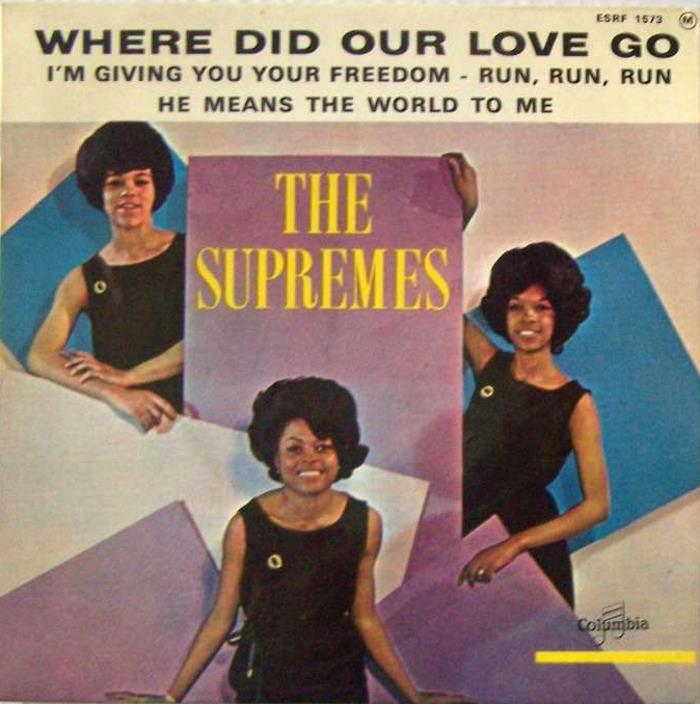In The Number Ones, I'm reviewing every single #1 single in the history of the Billboard Hot 100, starting with the chart's beginning, in 1958, and working my way up into the present.
The Supremes - "Where Did Our Love Go"
HIT #1: August 22, 1964
STAYED AT #1: 2 weeks
By the summer of 1964, Motown had already scored #1 hits with the Marvelettes, Little Stevie Wonder, and Mary Wells, and they'd come close with Smokey Robinson's Miracles. But the label didn't become a true cultural juggernaut until the Supremes came into their own. The Supremes were practically Motown in microcosm: three girls from Detroit who forced their way into music through sheer charm and determination and who then made themselves over, acting like stars the instant stardom arrived. Berry Gordy's whole idea with Motown was to record black music with flash and sophistication, drawing in white audiences in the process, and nobody knew how to do that the way the Supremes did. They ended the '60s with nearly as many hits as the Beatles, and their impact was nearly as great, too.
It didn't happen overnight. In the beginning, the Supremes were three girls from the same Detroit housing project. When they started singing together, they were the Primettes, the sister group to a male singing group called the Primes. (Two of the Primes, Eddie Kendricks and Paul Williams, went on to become Temptations.) At their first Motown audition, Berry Gordy turned the Supremes down and told them to finish high school first. But they hung around. They recorded for smaller labels, and they stayed around the Motown studios, filling in on handclaps and backing vocals whenever they could. Finally, they got their shot. But for their first few years on Motown, the Supremes couldn't get arrested. None of their singles landed. Famously, their nickname around Motown was the "No-Hit Supremes."
There's some dispute around this, but the generally agreed-upon story about "Where Did Our Love Go," the Supremes' first real hit, is that the team of Eddie Holland, Lamont Dozier, and Brian Holland wrote the song with the Marvelettes in mind. The Marvelettes thought it was terrible. The Supremes didn't much like it, either, but they weren't in any position to turn it down. They, too, thought the song was terrible. Diana Ross had to sing in a lower register than her usual one. Mary Wilson and Florence Ballard wouldn't do the intricate harmonies that Holland-Dozier-Holland had written, so then just ended up murmuring "baby, baby" in the background instead. Only the songwriters thought they had something here. They had something.
It's one of those too-neat historical coincidences that "Where Did Our Love Go" hit #1 only a few weeks after Lyndon Johnson signed the 1964 Civil Rights Act. "Where Did Our Love Go" isn't a song about historical struggle. It doesn't even sound much like soul music. It's icy, controlled. Diana Ross is singing about a rough, unstable affair -- "a burning love that stings like a bee" -- that's coming to an end, and there's subtle pain in the way she hesitates, the way she calmly stretches out syllables. But she's not wailing or gnashing. There's nothing churchy about her performance. Instead, she radiates calm and poise. The song doesn't sound like what you'd expect from a society in flux, but it was a product of that society, anyway. It's sharp, clean, beautifully realized pop music, as written, recorded, and produced by black people, released on a black-owned label. A whole lot more hits like it would follow.
"Where Did Our Love Go" is a song for dancing. Of all the intricate little things going on in the background, most of them are geared toward driving the song forward: the foot-stomps, the guitar stabs, the get-in-and-get-out sax solo. But there's also the crystalline xylophone and the subtlety of the piano. It's a dazzling little trick of a song -- restrained but instinctive, heart-wrecked but blasé. And it marked the beginning of one of the greatest runs that any group has ever had.
GRADE: 8/10
BONUS BEATS: Here's Adam Ant singing a charmingly theatrical and ridiculous cover of "Where Did Our Love Go," with a quick Diana Ross cameo, at the famous Motown 25th-anniversary TV special in 1983:






